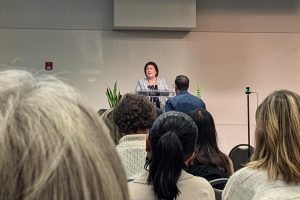Building relationships in new environment
How online learning has affected first-year connections
January 28, 2021

Starting college while maintaining social distancing has left first-years to meet their peers and make new friends almost exclusively online.
“Since the start of COVID-19, I feel like my social skills have changed drastically,” said first-year Brenda Fierro-Hernandez. “I love meeting new people, but it’s hard when there’s no one to talk to in person.”
Fierro-Hernandez decided to stay off-campus for Winter Quarter since all of her classes are online, but remote-learning has kept her isolated from her peers.
“I don’t think Zoom calls make any difference when it comes to meeting people,” said Fierro-Hernandez. “I don’t care what people say, it’s not the same and it never will be. Meeting face to face is such an important thing to have as human beings.
Human beings are social creatures, and while Zoom may be an effective substitute for working or learning during a pandemic, it’s not as effective for socializing.
“Before, I used to talk to everyone, and I was always outgoing,” said first-year Meridiana Mendez. “Now since everything’s online I feel the opposite; I feel more shy to talk in Zoom meetings. I’m too shy to unmute myself. It just feels different to me in that way.”
Everyone has had to adjust to the new social norms that come with doing everything remotely.
“I don’t know how to act now in class because I forgot how to just socialize with people,” said Mendez.
Mendez lived on-campus Fall Quarter but struggled to make meaningful connections with her peers since all of her classes were online.
“My hopes were to go to SPU and make new friends, but it just never really happened because we can’t sit in a class and have a good conversation,” said Mendez.
SPU is usually known for its sense of community, but it’s proven difficult to uphold that reputation while maintaining social distancing.
“You can’t really make friends over Zoom; it’s so hard,” said Mendez. “That’s why I decided to move back home for Winter Quarter: because I wasn’t really feeling that connection. I tried, but it just didn’t go the way I wanted it to.”
Coming back to school for Winter Quarter after having a month-long holiday break meant readjusting to living with the COVID-19 regulations on-campus.
“I think it was tough because when I did interact with people again it was just really weird. I don’t think it was impaired or anything, it was just something I didn’t really experience for a long time,” said first-year Teresa Pham.
With vaccines on the way, what the future holds for socialization in post-pandemic times is largely up for interpretation, but the psychological effects of social distancing may linger.
“I personally think when this whole thing is over, when we have the vaccine, we don’t have to social distance, we can go out in public, there’s no max capacity, I still think people are still going to get really scared,” said Pham.
The stigma around social interaction lies rooted in fear of contracting and spreading COVID-19, so it may take a while for people to stop associating close proximity with a deadly illness.
“It will take a while for us to kind of remember how things were before COVID-19. I think people are just psychologically, going to be kind of messed up,” said Pham.
Pham feels that for high-risk individuals especially, the transition back to normal will be a long road.
“I feel like that’s definitely going to be a shock-factor when things go back to normal,” said Pham. “I don’t know when things are going to go back to normal, but I think that stage before we settle in is going to be very tough.”


























































































